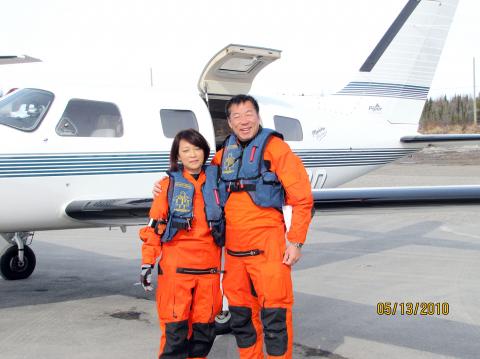The first Taiwanese pilot to circumnavigate the globe in a single-engine airplane died on Friday after the small plane he was flying crashed at San Gabriel Valley Airport in El Monte, California, the Ministry of Foreign Affairs said yesterday.
Jeffrey Ying (應天華), 63, was the first pilot from the US’ Chinese-speaking community to fly around the world in a single-engine airplane in July 2010.
Ying, a Taiwanese expatriate, had been running a fleet of planes with his friends in the US, who also flew the aircraft annually for Double Ten National Day celebration events at Monterey Park in California since 2011, Chinese American Pilots and Aircraft Owners Association director James Bu (卜君力) said.

Photo: CNA
The crashed plane had a Republic of China national emblem painted on the fuselage and was similar to a decommissioned air force trainer aircraft.
The cause of the crash was likely related to mechanical problems, the ministry said, adding that it would provide Ying’s family whatever assistance it needed.
The Los Angeles Times said that Ying’s Pazmany PL-2 took off at about 9:30am, but crashed shortly afterward.
Video broadcast by local TV news outlets from the scene at a corner of the airport showed the aircraft’s nose flattened at an angle and its left wing crumpled.
Ying, who had more than 2,000 hours of flight experience, acquired the PL-2 many years ago, Bu said.
Ying remodeled the plane to look like a Taiwanese trainer and painted the code 5858 himself, Bu said.
In 2010, Ying and his wife, Renee Chen (陳小平), took 82 days to fly 41,843km across 26 countries. Ying became the 166th person to accomplish the endeavor, the Chinese-language United Daily News said.

Intelligence agents have recorded 510,000 instances of “controversial information” being spread online by the Chinese Communist Party (CCP) so far this year, the National Security Bureau (NSB) said in a report yesterday, as it warned of artificial intelligence (AI) being employed to generate destabilizing misinformation. The bureau submitted a written report to the Legislative Yuan in preparation for National Security Bureau Director-General Tsai Ming-yen’s (蔡明彥) appearance before the Foreign Affairs and National Defense Committee today. The CCP has been using cognitive warfare to divide Taiwanese society by commenting on controversial issues such as Taiwan Semiconductor Manufacturing Co’s (TSMC, 台積電) investments in the

INVESTIGATION: The case is the latest instance of a DPP figure being implicated in an espionage network accused of allegedly leaking information to Chinese intelligence Democratic Progressive Party (DPP) member Ho Jen-chieh (何仁傑) was detained and held incommunicado yesterday on suspicion of spying for China during his tenure as assistant to then-minister of foreign affairs Joseph Wu (吳釗燮). The Taipei District Prosecutors’ Office said Ho was implicated during its investigation into alleged spying activities by former Presidential Office consultant Wu Shang-yu (吳尚雨). Prosecutors said there is reason to believe Ho breached the National Security Act (國家安全法) by leaking classified Ministry of Foreign Affairs information to Chinese intelligence. Following interrogation, prosecutors petitioned the Taipei District Court to detain Ho, citing concerns over potential collusion or tampering of evidence. The

‘COMPREHENSIVE PLAN’: Lin Chia-lung said that the government was ready to talk about a variety of issues, including investment in and purchases from the US The National Stabilization Fund (NSF) yesterday announced that it would step in to staunch stock market losses for the ninth time in the nation’s history. An NSF board meeting, originally scheduled for Monday next week, was moved to yesterday after stocks plummeted in the wake of US President Donald Trump’s announcement of 32 percent tariffs on Taiwan on Wednesday last week. Board members voted to support the stock market with the NT$500 billion (US$15.15 billion) fund, with injections of funds to begin as soon as today. The NSF in 2000 injected NT$120 billion to stabilize stocks, the most ever. The lowest amount it

NEGOTIATIONS: Taiwan has good relations with Washington and the outlook for the negotiations looks promising, Minister of Economic Affairs J.W. Kuo said Taiwan’s GDP growth this year is expected to decrease by 0.43 to 1.61 percentage points due to the effects of US tariffs, National Development Council (NDC) Minister Paul Liu (劉鏡清) said at a meeting of the legislature’s Economics Committee in Taipei yesterday, citing a preliminary estimate by a private research institution. Taiwan’s economy would be significantly affected by the 32 percent “reciprocal” tariffs slapped by the US, which took effect yesterday, Liu said, adding that GDP growth could fall below 3 percent and potentially even dip below 2 percent to 1.53 percent this year. The council has commissioned another institution